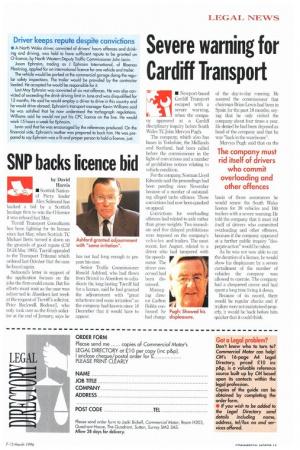Severe warning for Cardiff Transport
Page 17

If you've noticed an error in this article please click here to report it so we can fix it.
• Newport-based Cardiff Transport escaped with a severe warning, when the company appeared at a Cardiff disciplinary inquiry before South Wales TC John Mervyn Pugh.
The company, which also has bases in Yorkshire, the Midlands and Scotland, had been called before the commissioner in the light of convictions and a number of prohibition notices relating to vehicle condition.
For the company, Norman Lloyd Edwards said the proceedings had been pending since November because of a number of outstanding alleged tacho offences. Those convictions had now been quashed on appeal.
Convictions for overloading offences had related to axle rather than gross weights. Two immediate and five delayed prohibitions were imposed on the company's vehicles and trailers. The most recent, last August, related to a driver who had tampered with the speedow meter. The r driver concerned had been dismissed.
Managing director Carlton Hobbs confirmed he Pugh: Showed his had charge displeasure. of the day-to-day running. He assured the commissioner that chairman Brian Lewis had been in Spain for the past 18 months,saying that he only visited the company about four times a year. He denied he had been deposed as head of the company and that he was "back in the warehouse".
Mervyn Pugh said that on the
basis of those assurances he would renew the South Wales licence for 39 vehicles and 160 trailers with a severe warning. He told the company that it must rid itself of drivers who committed overloading and other offences, because if the company appeared at a further public inquiry "despeote action" would be taken.
As he was not now able to cut the duration of a licence, he would show his displeasure by a severe curtailment of the number of vehicles the company was allowed to operate. The company had a chequered career and had spent a long time living it down.
Because of its record, there would be regular checks and if trailers were not maintained properly, it would be back before him quicker that it could think.
















































































































